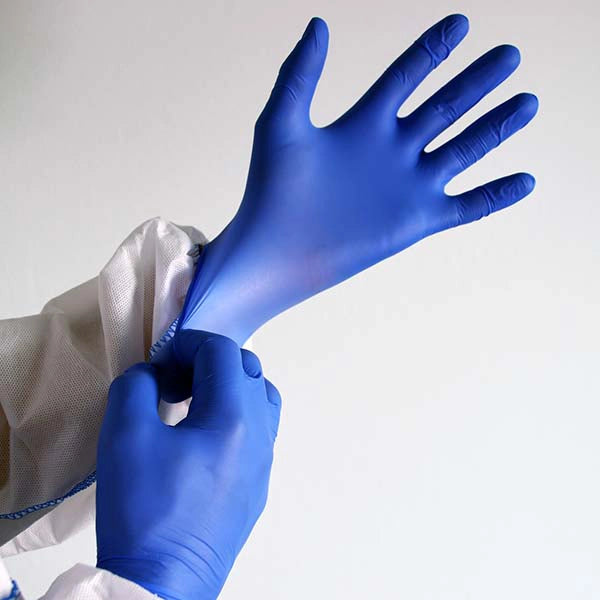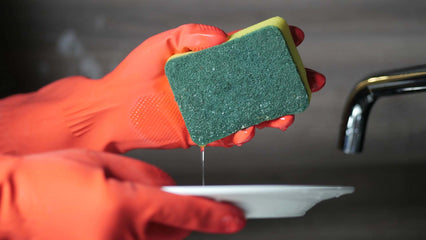Many industries rely on disposable gloves, including medicine, cleaning, cultivation, and food prep. These devices provide a barrier between the product or customer and the person doing the job — whether a doctor, a tattoo artist, or even a janitor.
Gloves help control infection and cross-contamination, protect against chemicals, oils, and solvents, and maintain hygiene standards. Three primary materials are used to construct disposable gloves — latex, nitrile, and vinyl — and all three are available as sterile or non-sterile products.
In this article:
The type of gloves you need depends on what you intend to use them for.
Typically, nitrile gloves are used in the medical industry — especially in surgery — as they offer the most substantial protection against tears and punctures. They also resist harsh chemicals without the user losing sensitivity in their hands.
Latex is also commonly used in the medical industry (as well as many other sectors); however, not everyone can use gloves made from this material due to latex allergies. Vinyl gloves don’t provide the same level of chemical resistance as nitrile or latex. However, they can be used when maintaining a hygienic barrier is essential — as in the food industry.
Since the pandemic of 2020, the use of gloves worldwide has become increasingly widespread, and they are now used more often than ever before. But how do gloves get from a state of raw material to being ready to enrobe your hands?
If you’re buying gloves online, the terminology surrounding suppliers, manufacturers, distributors, and wholesalers can quickly become confusing. Working out who’s who and what roles they take on in the industry can make buying gloves easier, cheaper, and quicker in the long run.
So, who’s who, and what’s what?

Glove Suppliers
Glove suppliers provide the materials that glove manufacturers use to make gloves. They are the start of the supply chain, providing the foundational materials needed to produce gloves.
However, they are not directly involved in glove manufacturing. Suppliers are essential in ensuring a steady flow of high-quality materials and are one of the most critical parts of the glove production process.
Glove suppliers are often confused with glove wholesalers, as it’s commonly thought the term “glove supplier” refers to those who supply gloves. However, they only supply the materials used to make gloves — a vital part of the glove supply chain.
Understanding the difference between suppliers and wholesalers is essential to understanding each role in turning the materials into the finished product and getting the gloves to your hands.
Glove Manufacturers
Glove manufacturers are the main link in the glove supply chain. Manufacturers will use glove suppliers to obtain large quantities of raw materials to make finished gloves. Manufacturers are the foundry of the industry, transforming bulk amounts of various raw materials into market-ready products.
Glove manufacturers transform raw materials such as latex, nitrile, and vinyl into the disposable gloves you are familiar with.
These businesses are entirely responsible for the glove production process, ensuring that quality, design, and functionality meet the market's demands. Unlike the suppliers that provide the raw materials, manufacturers create the final product.
The manufacturing phase involves various intricate processes depending on what type of glove is being made and what the gloves will be used for. Responsibility for quality control falls on the manufacturer to ensure the final product meets industry standards.
Manufacturers are also responsible for sterilizing gloves, so the environment in which they are made must also be sterile and up to industry standards — regardless of what the gloves will later be used for. Ensuring sterility is paramount for industries like the medical sector, where the risk of infection or cross-contamination is exceptionally high.

Glove Distributors
Glove distributors are subsequent in the chain, buying newly-made gloves in bulk from manufacturers to sell them to retailers or consumers at a marked-up price.
Distributors play a pivotal role in the distribution network, acquiring gloves for the best price possible before distributing them to retailers and consumers.
Working in specific geographical areas or with exclusive agreements, distributors typically don’t engage in the manufacturing process and instead focus on efficiently delivering the products to the market. Distributors bridge the gap between the manufacturer and the retailer or consumer, ensuring new gloves reach their destinations without delay.
Glove distributors have a much smaller selection than wholesale glove suppliers — often specializing in a specific brand or type of glove and thereby often demanding higher prices. If you need a variety of gloves and are using distributors, you might need to work with several different distributors to get all of the products you need.
Wholesale Glove Suppliers
Disposable gloves wholesalers purchase gloves in bulk from different manufacturers before reselling them to retailers or consumers. They often provide a range of products without any exclusivity and offer products from various manufacturers.
These wholesale glove suppliers contribute to the market by sourcing products from various manufacturers and offering a broad spectrum of choices to both retailers and consumers.
Wholesale suppliers are similar to distributors. However, they often offer a much more comprehensive range of products from multiple manufacturers. They provide products for both retailers and consumers, selling in bulk with a diverse range of inventory.
An expansive inventory means a much broader customer base, providing everything from medical-grade gloves to disposable gloves used in catering.
Wholesale disposable glove suppliers are a “one-stop shop” for all your glove supplies. They offer vinyl, nitrile, and latex gloves — both sterile and unsterile — in one location, so you can get everything you need at once and in bulk.
Wholesale is often the best way to save money for businesses or individuals who use gloves daily — or even more frequently than that. The more gloves you buy, the cheaper the end cost, and most good wholesale suppliers will offer further discounts on shipping costs when it comes to purchasing large quantities in bulk.
Due to the large scale of wholesale supply, these businesses often collaborate with manufacturers from all over the world, giving the consumer a much more comprehensive range of options — from eco-friendly materials to innovative designs, as well as specialized gloves for different industries.
More importantly, wholesale suppliers provide a streamlined service for businesses or individuals who need to make repeat or scheduled orders to ensure they always have the gloves they need to maintain business continuity.

Conclusion
Understanding the difference between glove suppliers, manufacturers, distributors, and wholesale suppliers is essential to making informed decisions when buying gloves for personal or professional needs.
Simply put, suppliers provide raw materials, manufacturers craft the gloves, distributors bridge the gap, and wholesale suppliers offer a diverse final product range. Knowing who’s who and what’s what provides knowledge that can help you save time and money when buying gloves — especially when purchasing multiple types of gloves in bulk.
If you’re buying gloves regularly, wholesale suppliers are the best place to pick them up — especially if you require various glove types. Wholesale suppliers often offer a better price than distributors and provide a much more extensive range of products.
Whatever you need gloves for, always choose a reputable brand and source. Cheap gloves can be tempting, especially when you’re using them daily. However, it’s much more important not to cut corners and only choose a product you can rely on when it comes to hygiene and protective barriers.
Gloves sold through reputable wholesale suppliers will have gone through several quality control tests. They will be built to the highest industry standard — which is essential for the wearer's safety, especially in the medical industry.




